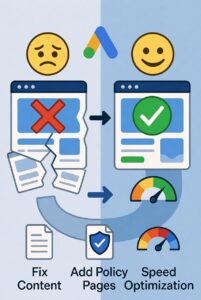
How to Earn Money from SEO: A Step-by-Step Guide
The Ultimate Guide to Earn Money from SEO: Building a Sustainable Online Income in 2025
Meta Description: Discover the proven strategies to earn money from SEO. This ultimate guide reveals 5 powerful methods, from affiliate marketing to local lead generation, with a step-by-step blueprint to build your sustainable online income stream.
Introduction: The Transformative Power of SEO
The digital landscape is noisy and competitive. Every day, millions of businesses and individuals vie for attention on social media, through email, and with paid ads. But there is one channel that, when mastered, provides a consistent, scalable, and owned source of traffic and revenue: Search Engine Optimization.
To earn money from SEO is to understand a fundamental truth of the modern internet: when someone has a question, a problem, or a desire to buy, they go to a search engine. By positioning your content, product, or service directly in front of these actively searching individuals, you tap into a powerful economic engine. This isn’t about get-rich-quick schemes; it’s about building a valuable digital asset. This comprehensive guide will demystify the process, providing you with the actionable strategies and foundational knowledge you need to start your journey and truly earn money from SEO.
Part 1: The Foundation – Understanding the SEO Ecosystem
Before you can earn money from SEO, you must understand the machine you’re optimizing. SEO is built on three interdependent pillars.
1. Technical SEO: The Bedrock of Rankings
Think of your website as a physical store. Technical SEO is the foundation, plumbing, and electrical wiring. If it’s flawed, customers (and search engines) can’t get in or have a poor experience.
- Site Speed & Core Web Vitals: Google prioritizes user experience. A slow website leads to high bounce rates and lower rankings. Focus on Largest Contentful Paint (LCP), Cumulative Layout Shift (CLS), and Interaction to Next Paint (INP).
- Mobile-Friendliness: With most searches on mobile, your site must be perfectly responsive. Google uses mobile-first indexing, meaning it primarily uses your site’s mobile version for ranking.
- Crawlability & Indexability: Can Googlebot find and understand your pages? A clean
robots.txtfile, a logical URL structure, and a comprehensive XML sitemap are essential. - Site Architecture: A flat, intuitive site structure with strategic internal linking helps distribute “link equity” and allows users and bots to navigate effortlessly.
2. On-Page SEO: Optimizing for Intent and Relevance
This is where you align your content with what both users and search engines are seeking.
- Keyword Intent: The cornerstone of modern SEO. You must understand why someone is searching. Are they looking to learn (informational), find (navigational), do (transactional), or buy (commercial)? Your content must satisfy this intent.
- E-E-A-T: Experience, Expertise, Authoritativeness, and Trustworthiness. This is a core part of Google’s guidelines. Demonstrate your credentials, cite sources, and create accurate, high-quality content to build trust.
- Content Depth & Quality: “Content is King” remains true, but context is Queen. Create the most comprehensive, valuable resource on a topic. Answer every possible question a searcher might have. This “skyscraper” technique is how you dominate search results.
- On-Page Elements: Optimize your
<title>tags (your clickable headline in search results), meta descriptions (your ad copy), header tags (H1, H2, H3), and image alt text.
3. Off-Page SEO: Building Authority in Your Niche
This is about your website’s reputation across the internet, primarily built through backlinks.
- The Power of Backlinks: A link from another website to yours is a vote of confidence. A link from a reputable, authoritative site like Forbes or a leading industry blog is a powerful signal to Google that your content is valuable.
- Link Earning vs. Link Building: The old way was aggressive link building. The sustainable way to earn money from SEO is through link earning—creating such exceptional content that others naturally reference and link to it as a resource.
- Digital PR and Brand Signals: Mentions of your brand online, even without a direct link, contribute to your overall authority.
Part 2: The Five Proven Avenues to Earn Money from SEO
Here are the five most effective models to monetize your SEO efforts.
Avenue 1: Affiliate Marketing (The Digital Salesperson)
This is one of the most popular ways to earn money from SEO. You promote other companies’ products and earn a commission for each sale or lead you generate.
- How to Implement:
- Choose a Profitable Niche: Select an area with high-value products and strong consumer demand (e.g., finance, software, home goods, outdoor gear).
- Build an Authority Site: Create a website focused on that niche. Don’t just create a thin “review site”; build a true resource with blogs, guides, and tutorials.
- Create In-Depth Review and “Best X” Content: This is the core of affiliate SEO. Write exhaustive, honest reviews and comparison articles that help people make a buying decision. Target long-tail keywords like “best running shoes for flat feet” or “HubSpot vs. ActiveCampaign pricing.”
- Join Affiliate Networks: Sign up for networks like ShareASale, CJ Affiliate, and Impact Radius, or apply for direct affiliate programs from companies you want to promote.
- Real-World Example: A website like “Wirecutter” dominates search results for thousands of product review keywords. Their thorough testing and unbiased advice generate immense trust, leading to millions in affiliate revenue.
Avenue 2: Display Advertising (The Publisher Model)
You create valuable content to attract a large audience and monetize that traffic by displaying ads on your site.
- How to Implement:
- Select a Broad, Ad-Friendly Niche: Choose a topic with high advertising demand (CPM). Finance, insurance, and technology niches typically pay more per thousand impressions than hobbies.
- Focus on Volume and Quality: Publish a high volume of high-quality, SEO-optimized articles targeting informational keywords. The goal is to become a go-to resource in your space.
- Start with Google AdSense: This is the easiest network to join but offers lower payouts.
- Graduate to Premium Ad Networks: Once you hit 50,000+ monthly pageviews, apply to premium networks like Mediavine or Raptive. They use header bidding to dramatically increase your ad revenue, often 3-5x more than AdSense.
- Real-World Example: A personal finance blog that publishes articles on “how to save for a house” or “best high-yield savings accounts” attracts an audience with high disposable income. Premium advertisers pay top dollar to display ads to this demographic.
Avenue 3: Local Lead Generation (The Service Provider)
If you own a local business, this is the most direct way to earn money from SEO. You optimize your online presence to get more phone calls, form fills, and customers walking through your door.
- How to Implement:
- Master Google Business Profile (GBP): This is non-negotiable. Completely optimize your GBP with high-quality photos, accurate business information, regular posts, and a strategy to gather genuine customer reviews.
- Create Location-Specific Pages: Have a dedicated, SEO-optimized page for each city or area you serve (e.g., “Plumber in Denver,” “Electrician in Northwest Houston”).
- Build “Problem-Aware” Content: Create blog content that answers the questions your potential customers are asking. A divorce lawyer should write about “how to file for divorce without a lawyer,” knowing that many searchers will eventually realize they need professional help.
- Real-World Example: A roofing company creates a service page optimized for “emergency roof repair [City Name]” and supports it with blog posts like “How to Spot Storm Damage on Your Roof.” When a homeowner has a leak, they find this company at the top of the search results.
Avenue 4: E-commerce SEO (The Online Store)
Drive free, targeted traffic directly to your product pages and category pages.
- How to Implement:
- Optimize Product Pages: Go beyond manufacturer descriptions. Write unique, compelling copy, use high-quality images/videos, and incorporate keywords naturally into product titles and descriptions.
- Leverage Schema Markup: Implement Product schema to give Google detailed information like price, availability, and review ratings, which can lead to rich results in search.
- Create Thematic Category Pages: Instead of a generic “Shoes” category, create pages for “Best Running Shoes for Women” or “Waterproof Hiking Boots,” supported by informative content.
- Build an Informational Blog: A furniture store can create blog posts like “How to Style a Mid-Century Modern Living Room” that naturally link to their relevant products.
- Real-World Example: An online supplement store uses detailed product descriptions and a blog with articles on “pre-workout supplement benefits” to rank for both commercial and informational keywords, driving highly qualified buyers to its site.
Avenue 5: Selling SEO Services (The Consultant)
Once you have the skills and can demonstrate results (often by ranking your own site), you can earn money from SEO directly by offering your services to other businesses.
- How to Implement:
- Build Your Own SEO Portfolio: Your own successfully ranked website is your best case study.
- Specialize: Focus on a specific service (e.g., technical SEO audits, local SEO, or link building outreach) or a specific industry.
- Network and Outreach: Use LinkedIn, local business groups, and cold outreach (with a valuable pitch, not just a sales email) to find clients.
- Offer Packages: Create clear service packages (e.g., a one-time audit, a monthly retainer for ongoing optimization) to simplify the sales process.
Part 3: Your Step-by-Step Blueprint to Start and Scale
Ready to begin your journey to earn money from SEO? Follow this actionable plan.
Phase 1: Foundation & Strategy (Weeks 1-2)
- Niche Selection: Choose a niche you’re passionate about that has proven profitability (check affiliate networks and ad rates).
- Keyword Research: Use tools like Ahrefs, Semrush, or even free versions like Ubersuggest to find keywords with decent search volume and manageable competition. Focus on long-tail keywords.
- Competitor Analysis: Identify the top 3-5 sites ranking for your target keywords. What are they doing well? What content gaps can you fill?
- Website Setup: Choose a reliable hosting provider (e.g., SiteGround, WP Engine) and install WordPress. Select a fast, mobile-friendly theme.
Phase 2: Content Creation & Initial Optimization (Weeks 3-12)
- Create a Content Calendar: Plan your first 10-15 articles based on your keyword research.
- Publish Pillar Content: Focus on creating comprehensive, “pillar” articles that cover a topic broadly. Then, create smaller “cluster” articles that link back to the pillar page.
- On-Page SEO: For every article, optimize the title tag, meta description, headers, and images.
- Basic Technical Setup: Install an SEO plugin (like RankMath or Yoast), submit your XML sitemap to Google Search Console, and ensure your site is mobile-friendly.
Phase 3: Link Building & Scaling (Months 4+)
- Begin Outreach: Start with broken link building or the “skyscraper technique”—find great content in your niche, create something better, and email the sites that linked to the original to let them know.
- Analyze Performance: Use Google Search Console and Google Analytics to track your rankings, traffic, and user behavior. See which content is performing well and double down on that topic.
- Scale Successful Content: Update and improve your top-performing posts. Expand on them. If a post on “best laptops for students” is doing well, write a follow-up on “best student laptop accessories.”
Conclusion: Your Path to Financial Freedom Starts Now
The ability to earn money from SEO is a powerful and accessible skill in the digital age. It requires patience, consistency, and a commitment to providing genuine value. There are no shortcuts, but the reward is a sustainable, scalable online business that you own and control.
Your journey begins with a single step: choosing your niche and publishing your first piece of high-quality, optimized content. The algorithms will change, but the core principle will remain: the best way to rank in search engines is to create the best possible answer for the person behind the search query. Start building your asset today.





















Post Comment